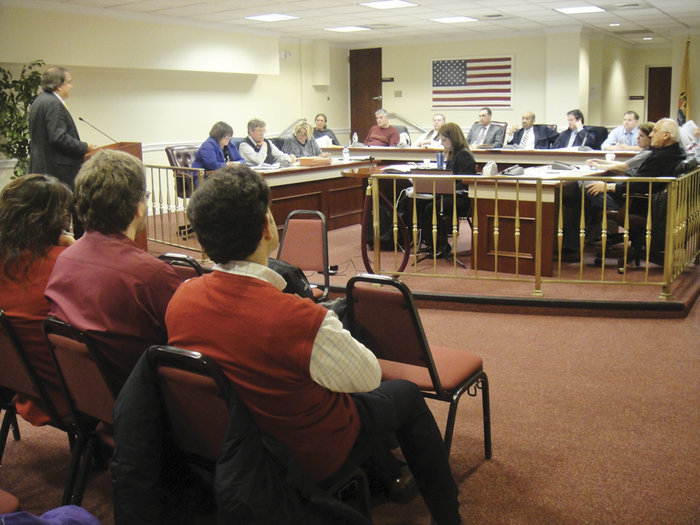After five years of hearings, engineering surveys, and protests, the Planning Board voted on Tuesday to unanimously approve the Appleview luxury condominium project on River Road in North Bergen, near the Guttenberg border.
Scaled down from the original nine stories and 140 units proposed in the spring of 2007, the project, now five stories and 59 units, will be built at 7009 and 7101 River Rd. below the Palisade Cliffs.
It has generated heated controversy which, despite Tuesday’s action, may not be over.
John Lamb, attorney for residents of the Galaxy Towers in Guttenberg who have fought the project from the start, said they may go to court to appeal.
“The public is very disappointed that yet again we don’t think the issues are adequately dealt with,” said Galaxy resident Siat Ng. “I believe the Planning Board made a mistake in assumption that Appleview poses no danger to the pipeline. It’s an overall disappointment at the Planning Board.”
Galaxy residents are waiting for the resolution and will proceed from there.
“Most residents feel strongly because the safety issues were not adequately addressed, we’ll probably vote for an appeal but we haven’t decided on that yet,” said Ng.
Opponents of the proposal have raised a long list of objections. They complained that the initial plan would block their views of the Hudson River and New York skyline. They objected to the variances from the zoning codes requested by developer Carmelo Spoleti concerning lot coverage and the degree to which the project could affect the Palisade Cliffs, which were declared a landmark by the National Parks Service in 1983.
A unanimous ruling after five years of controversy.
____________
Portions of the site are in both North Bergen and Guttenberg, causing possible confusion as to which units belonged to which township’s tax base.
Recently, Guttenberg officials asked the board to delay their decision so they have more time to consider whether to grant Spoleti an easement to allow Transco employees to access the gas pipeline from the Guttenberg side if necessary.
Pipeline worries
The most vigorous objections concern the natural gas pipeline owned by Texas-based Transco Williams, a high-pressure conduit supplying more than 40 percent of New York City’s natural gas supply.
Over the years of hearings, residents have questioned whether the local and county planning boards have given adequate attention to the possible danger from a pipeline.
The explosion of a natural gas pipeline in September 2010 in San Bruno, Calif., added additional impetus to the objections.
Officials and engineers from Transco Williams have been largely absent from the deliberations despite demands from neighbors of the project for more information. After the Hudson County Planning Board approved the project in July 2011, Galaxy residents appealed, and Superior Court Judge Christine Farrington remanded the hearings back to the local board.
She ruled the board had failed to adequately consider the safety concerns over the pipeline and erred in not requiring Transco officials to testify in the hearings.
A decision on the proposal was delayed in October 2012 until further information could be reviewed from the Federal Emergency Management Agency (FEMA) and the Department of Homeland Security.
At that time, Lamb repeated his demand for Transco to provide a pipeline safety expert to identify all the risks. Although they provided civil engineers, he said it was not enough. Lamb said that the main evidence is a risk identification report by Engineer Calisto Bertin, but the opponents of the project would have preferred a report by a pipeline safety expert.
“Finally it took a court order for Transco to show up,” said Lamb, referring to Bertin’s presence at the meeting. “They want the rights but not the obligation. We want every conceivable risk identified.”
Lamb agreed that some good came from the remand back to the Planning Board, which led to additional safety stipulations.
The cliffs
Preservationists have claimed for years that too much soil and rock would be removed from the cliffs behind the development.
At a July 26, 2012 meeting, Lamb cross-examined Bertin after the engineer did a slope stability study and a risk identification.
At the meeting, members of the public and Lamb discussed concerns that rocks and soil could slide off the Palisade Cliff toward River Road during construction.
Bertin testified that 2,200 cubic yards of soil will be removed or excavated from the site, but some of it will be used to level off the area. Lamb said he considered this a “substantial removal” of soil.
“[There will be] some rock removal but not a lot,” said Bertin. “A substantial part of this slope is already stabilized by prior owners or users of the property.”
Lisa Mahle-Greco of Johnson Soils Company conducted a more recent slope stability report for Appleview, and also answered questions at the hearing.
Residents began asking whether there would be blasting at the site.
Both Mahle-Greco and Bertin said that the rock removal would mainly be loose rock that would just be moved, rather than blasted. They both said that there won’t be a substantial excavation of the slope.
Vanessa Cruz can be reached at vcruz@hudsonreporter.com
